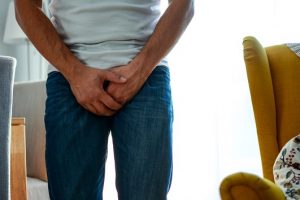
But the truth is that doesn’t stop. Many men in their late 50s and beyond live through another coming-of-age experience: an enlarged prostate.
Medically, this condition is known as benign prostatic hyperplasia, or BPH. It affects roughly 70 percent of US men between 60 and 69, and 80 percent of those 70-plus.
And the chances keep going up the longer you live.
Thankfully, BPH is not always a serious health condition. It can be extremely frustrating and irritating, but it may not cause any life-threatening illness. That doesn’t mean, however, that it isn’t something you shouldn’t keep an eye on.
One of the most common symptoms of BPH is getting up during the night to pee. But that doesn’t necessarily mean you have an enlarged prostate.
You may be drinking too much in the evening and your body doesn’t need to expel the excess liquid until after you’ve laid down to bed.
Watching how much, and what, you drink after 6 or 7 PM may help relieve your nighttime urges.
If that doesn’t work, pay attention to learn if you’re experiencing any of the following:
- Difficult to start peeing when experiencing an urge to go
- Straining to pass urine
- Having a weak urine flow
- “Stop-start” peeing (it doesn’t flow out in one steady and consistent stream)
- Strong and frequent urges to urinate
- Accidentally leaking urine
- Getting up during the night to pee
The more of those you notice, the more likely it is that your prostate gland is getting bigger. Book a trip to see your doctor for an exam to develop a treatment plan.